So lift your hearts to receive his benediction – may his love, his grace, and the fellowship of his Spirit be with you all now and forever, Amen.
Sunday, December 31, 2006
Benediction
So lift your hearts to receive his benediction – may his love, his grace, and the fellowship of his Spirit be with you all now and forever, Amen.
Saturday, December 30, 2006
Friday, December 29, 2006
Sid Waddell
One attraction was Sid Waddell, a legend in TV sports commentary. As his official website puts it, Sid IS Darts.
Here are some Sid quotes (if you don't know of Sid, read them with a Geordie accent in mind):
"Jocky Wilson ... what an athlete."
"He's about as predictable as a wasp on speed."
Unbreakable
Just finished watching Unbreakable. I'm real dull, I didn't see the twist before it was revealed. Same as I didn't foresee the twist in The Sixth Sense.
Wednesday, December 27, 2006
Changes
Mark Driscoll et al got dropped a while back for being too manly. I can't live up to all that male ego driven stuff.
Riddleblog was just becoming too negative. I don't remember reading a positive post about anyone outside of a peculiarly narrow set.
Behold, good news! CG has taken Riddleblog's place in my blogging world. Hail to the university teacher of English Lit!
Princeton Shed's Post Christmas Message
This was my first Christmas away from family. The only thing I missed was a turkey Christmas dinner. Beef and ham were on offer at the Christmas dinner I was invited to by Muriel Burrows. As you can read Muriel has a rather interesting life story. Conversation around the dinner table was interesting. There were four nationalities represented in a dinner party of eight. James Fowler was present too, he's a member at Witherspoon and a final year MDiv student at the PTS.
As well as two Christmas Eve services at Witherspoon Street church, I also attended a late night Christmas Eve service at Westerly Road Church. This was one of my best church experiences so far in the US. The church building felt like a typical independent evangelical, or open brethern, hall in the UK, so I didn't feel out of place. But the service contained the most interesting collection of readings I've ever heard in such a church. As well as the usual New Testament readings, there were readings from Anselm's Proslogion, Christmas by Augustine, (get this!) Charnock's Existence and Attributes of God, C.S. Lewis's 'The Grand Miracle', and Herbert's Love (III).
I think the service worked, although the Charnock reading was a little too ambitious. But, there was no sermon. I attended the service with my friend, Benjamin. Benjamin is a young RC scholar preparing for ministry in the RC church while completing his PhD. He and I have enjoyed several meals together over the Christmas period. Benjamin felt there was no explanation of the readings during the service.
I thought this was an interesting observation. How much do we rely upon the 'givenness' of the Christmas story? I could appreciate the readings because I knew the territory, I knew the language of Westerly Road's tradition. Benjamin's understanding of the church and of the gospel is really quite different. His persistent comment was that he couldn't understand how the readings were related to each other. For him, they didn't represent a coherent tradition of interpreting the incarnation. For Benjamin, there was no proclamation of the meaning of Christmas in the service.
Over the next few days I need to: write a sermon based on Luke 4:14-30; re-read Sandeen's The Roots of Fundamentalism (PTS library has recalled it); finish some draft papers on W.G.T. Shedd. I travel to Lancaster, PA, on the 31st Dec and return the next day to begin work on another paper and on notes for a Sunday School class I'm about to start teaching for 5 to 7 year olds. 5 to 7 year olds - help!!
Friday, December 22, 2006
No beard
Before this, folks tended to react against it: for example, this fantastical comment "...the foulest thing I've seen all day."
To be fair that quote came my way a day or so after Burt Reynolds Day. I was wearing a moustache Fu Mancho style.
The beard may return in 2007.
Thursday, December 21, 2006
Trident
Though the nations rage from age to age,
we remember who holds us fast:
God's mercy must deliver us
from the conqueror's crushing grasp.
This saving word that our forebears heard
is the promise which holds us bound
till the spear and rod can be crushed by God
who is turing the world around.
From, Canticle of Turning by Rory Cooney
Wednesday, December 20, 2006
Caretaker
I've got rough drafts for two of my three papers due in January. Christmas week will be relatively quiet, so I'll be able to get a substantial amount of work done. Not least I'll need to write a sermon for 31st December, to be preached at Witherspoon Street Presbyterian Church. The text will be Luke 4:14-30.
On Sunday, I travelled to NYC to meet Johnny and Judith Keefe. We attended one of the evening services at Redeemer Presbyterian Church, but the main thing was simply catching up and sharing stories about life in the US. Oh, and we had a drink in the coolest bar ever, a few stories up, overlooking Central Park. The skyline of upper East Side is breath taking for an Ayrshire country bumpkin. New York is just soooo cool.
Over Christmas and New Year I will have real responsbility. Jenny wants me to look after her amaryllis. I think the deal is I get to use her car in return during the holiday. I passed her driving test, but shifting gear with your right hand is just wrong.
Lots of students house sit for rich Princeton people. This afternoon a couple of us are going to watch a DVD in a very big house. Very nice!
Thursday, December 14, 2006
Up the Status Quo?
Amazing
Tuesday, December 12, 2006
Helm on Warfield
Here are some general thoughts:
Why do current Reformed thinkers insist on defining Christ's humanity in terms of our own humanity? I think we need to start defining humanity in terms of divinity, while retaining the creature/creator distinction. So, most talk of divine impassibility seems silly to me, if, as I suspect, the definitions of human and divine nature are skewed from the outset by extra-biblical concepts.
Helm refers to a lecture by Carl Trueman, and he mentions John Murray's criticism of Warfield. I think this criticism is fascinating. It fascinated me when I came across it, because I'd always assumed that Warfield and Murray were singing from the same psalm book. I believe that Warfield tried to do as much justice as he could to Philippians 2 within a strict confessional christology (Chalcedon). I'm not sure Murray really understood Philippians 2, hence his criticism of Warfield. Warfield's exegesis of John 3:16 also pushes the edges of his Reformed orthodoxy - Warfield was an eschatological universalist - he believed that God really did love the world - the world is, however, defined eschatologically.
If I have a problem with the Chalcedon formula, can I reformulate my christology without denying the Christian faith? It strikes me that Chalcedon is actually a problem for faithful Bible readers - they've got to read the Bible with a Chalcedonian lens, otherwise they are anathema.
Finally, Shedd has some interesting ideas on divine impassibility. While claiming to retain the doctrine of impassibility, he writes about the 'inward suffering' of God in the work of atonement. Shedd also puts some emphasis on the unity of God at this point, something that I rarely read much about in contemporary (evangelical) discussion.
One of my current professors, Bruce McCormack, is really forcing me to think about all this kind of stuff. His class on the atonement is probably my first proper course in dogmatics. His articles in Justification in Perspective, and, The Glory of the Atonement, are really useful - but, then again, I've heard him teach these ideas in class - that makes a huge difference to your understanding as you read them from the page.
Back to NYC
I'm about to register for spring semester classes. It's been a tricky choice, mostly because there is so much to choose from, and Th.M. studs can do whatever they want (I hope). Registration for classes is online and provisional, so if I change my mind over the first week or two, switching classes is possible.
My overall experience here first term means my choice is totally different to what I'd planned in September. (I'd anticipated choosing classes for the whole year in October.)
I will now not be taking the Jonathan Edwards class. One reason for this is simple - I find Edwards difficult reading. I know he's the bees knees, and all that, I just struggle with him, more than I struggle with Owen and some of the Puritans. I've also decided to drop the idea of Scottish Philosophical Tradition - too niche, and too close to home.
I've realised that I'm on track to be a pastor/minister, and the day looms when that's what I'll be about - so...
Here are my choices: The Devotional Lives of Great Saints of the Church; Pastor as Person; and, The Minister and Mental Illness. All these themes are important in themselves, regardless of the quality of the teaching. And, I will have 3 days a week off! 3 days to work on my thesis, do occasional things at Witherspoon church, and explore parts of the East coast.
So, no theology in my second semester of a Th.M. Controversial!
Today, I'm also giving a short presentation (5 mins) on the state of the church in Scotland. I'll try not to be too pessimistic... Later in the day I head to NYC to hear Damien Rice in concert.
Between times I'm working on my paper on Shedd and the atonement. Shedd, with his traducianism, believed that Christ's human nature existed in an unindividualised form all the way back to Adam and Eve. I might reflect on what, if anything, this means for the atonement - I doubt Shedd takes it anywhere, because he argued that the Holy Spirit effectively justified and sanctified Christ as an Old Testament believer in the moment of his (human) conception.
Taxing stuff for a no brain-er like me to think about - these days, I'm glad if I remember the basics of grace. Why do we forget so easily?
Monday, December 11, 2006
...for the time is near.
Sunday, December 10, 2006
DC
As usual, check out my bebo page for pictures of the day - and, check out 'Burt Reynolds Day 2006 at PTS' too
Sunday, December 03, 2006
How to blog at seminary
In case of confusion, here is the context of my slightly outrageous and exaggerated remarks above.
It reads like a sad time for WTS. But, in Presbyterian history, these kind of situations tend to come around again sooner or later. The problem, in part, is that seminaries are dangerous. They are a bad idea. I've said this in a PTS precept, and I'm not afraid to publish that view publicly. The effective disconnect between seminary and church compounds the whole discussion. And, the discussions in these posts (here and here) illustrate the ambiguous role of seminaries within 'the academy'.
But even though I'm having a great time here I'm really not sure about the idea of a seminary. PTS really is a great place. But do seminaries really have a purpose or a future?
UN NYC 007

This is what I had to eat:  The place was linked to a famous movie.
The place was linked to a famous movie.
And the picture below reminds me of another famous movie:
Of course, the picture is the chamber of the UN Security Council. Every time I see the chamber on TV, I think: Bond, James Bond. Being in the chamber really felt like being on the set of an old Bond film.
But there is a new Bond film! I went to see it this evening. With three gorgeous females. Here are my marks out of 10 for various aspects of the film:
Opening credit sequence/Casino Royale theme music: 5/10
First action sequence, chasing the bomber: 8.5/10
Airport sequence: 9/10
Daniel Craig: 9/10
Gadgets: 7.5/10
Cardiac arrest scene: Just too silly to rate. Would Bond fall for such a simple ruse in the first place? Even if he did, and even if you could do a self defib thing (with a little help from your beautiful side kick), how do you then go on to win a game of cards? I'd need a nap first - then I'd go back to the card game.
Baddie: 6/10
Females: 10/10
Overall: 9/10
I thought it was a great film. Lots of action, lots of nice unexpected bits, touchy feely stuff too, but a hard Bond under it all.
Conversation after the film was different from my usual 'new Bond' experience. Usually, I'd engage mates about where the film ranks in the overall Bond list, etc. This time, the conversation turned on blond hair, blue eyes, and well defined muscles.
Thursday, November 30, 2006
Wishful thinking?
Jürgen Moltmann, The Coming of God: Christian Eschatology, trans. Margaret Kohl (Minneapolis: Fortress Press, 2004 paperback edition), p.255.
Beard
After May 2007 I will enter a life which demands a perennial clean shaven, shirt, tie, slacks (or flannels!) and sports jacket look. It's now or never for the scruffy beard look. Folks here just love it.
Independently, two or three friends suggested the idea. One good friend offered me a seven point plan to growing a beard (he asked me not to publish it). I can simplify the plan without fear of breaking my promise: don't shave for at least two weeks, and then take stock. Another friend suggests four weeks is required.
I do not intend to publish any pictures. You will all have to act cute if you wish to see my progress. If I shave in the next two or three weeks, I promise to take a picture before and after. Whether or not I publish is another matter entirely.
Saturday, November 25, 2006
Thanksgiving
 Travelled to NYC early Thanksgiving Day (23rd Nov) for the 80th Macy Parade. The weather was wet, windy, cold. The parade lasted maybe two and a bit hours. But it was a genuine American experience - I was glad I made the effort to get up at 5am to make the journey. Highlights? Enjoyed some really good company (there were 5 of us). Saw Julie Andrews (the hills are alive with the sound of music), Miss USA 2006 (below) and Gloria Estefan (help, help, the rhythm is going to get me). Snoopy, Garfield, Big Bird, and Santa Claus all made appearances too.
Travelled to NYC early Thanksgiving Day (23rd Nov) for the 80th Macy Parade. The weather was wet, windy, cold. The parade lasted maybe two and a bit hours. But it was a genuine American experience - I was glad I made the effort to get up at 5am to make the journey. Highlights? Enjoyed some really good company (there were 5 of us). Saw Julie Andrews (the hills are alive with the sound of music), Miss USA 2006 (below) and Gloria Estefan (help, help, the rhythm is going to get me). Snoopy, Garfield, Big Bird, and Santa Claus all made appearances too. Later in the day I spent time with friends over a Thanksgiving meal. Quite simply the best Thanksgiving meal I've ever enjoyed. The turkey was cooked to perfection, the cheesy mash was exquisite, the pie was delicious (it should have been, at least the one I bought - it was $15!). And the dinner party included several people who are becoming excellent friends.
Later in the day I spent time with friends over a Thanksgiving meal. Quite simply the best Thanksgiving meal I've ever enjoyed. The turkey was cooked to perfection, the cheesy mash was exquisite, the pie was delicious (it should have been, at least the one I bought - it was $15!). And the dinner party included several people who are becoming excellent friends.
All in all, a great couple of days. Tomorrow I'm back to WGT Shedd on the atonement, Moltmann's The Coming of God, and I'll have to read some more Barth too.

Wednesday, November 22, 2006
Atonement
On the mount of crucifixion
Wednesday, November 15, 2006
Nerf Wars Escalate in Alex
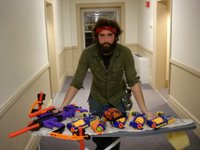 Dealing in Nerf arms has become a way of life on Alex 4.
Dealing in Nerf arms has become a way of life on Alex 4.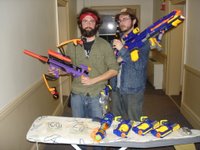 Two militiamen, suspected to be leading players in the war.
Two militiamen, suspected to be leading players in the war. Soldiers guard territory day and night.
Soldiers guard territory day and night.
It is too early to predict how events will unfold. All that is certain remains the common feature of all such conflict: there can be no winners until peace returns to Alex 4.
Saturday, November 11, 2006
Dalglish in Texas
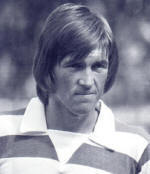
Kenny Dalglish used to be one of my heroes, not just because he was from Glasgow, and had great hair, but because he played football real good. So, I was interested to read this story about his son, Paul, commenting on why he moved to Texas:
"I had always wanted to come to the States, not just for the football but for the lifestyle... And the football out here is deadly serious. That's why I wanted to come here before I was 30, I didn't want people to accuse me of coming out here to take the money."
I can empathise with Dalglish. I didn't come to the States just for the theology, but for the lifestyle too. Alas, theology here is not deadly serious - at times, it's a bit of a joke. The scholarship money is good, but it's not that good. Soon, I'll have to start working for a living again.
And, I'm still waiting for my parents to use Skype...
Friday, November 10, 2006
Midterms
And, I watched this clip live on The Daily Show election night special. Listen out for the line to end all politico-religious comedy lines 'We were this close to Jesus coming back.' (The Colbert Report is a spin off from The Daily Show.)
The thing is: it's all so close to the truth. In the context of seminary life, this is especially the case. Politics is so married to religion over here that you don't need to ask anyone whether they are Democratic or Republican. You just know by what church they go to, or don't go to.
On Wednesday afternoon I also happened to catch the President's press conference announcing Rumsfeld's resignation. Rumsfeld went to Princeton University - there's a picture of him as a student in one of the local pub-restaurants. I write 'pub-restaurants' because you don't find pure pubs in Princeton. Strange but true - if you go for a drink, you sometimes need to order food just to get a table just to get some beer.
If I ever settle in the US, I'd want to head west. Montana, I think, away from all the political madness of the East coast. Any thoughts on which US state I should aim for?
PS - I've actually started writing drafts for papers and stuff. I'm overwhelmed. My first efforts are concentrating on a paper looking at Shedd's philosophy of history, linking this to his traducianism, and his defence of the Confessional standards of the Presbyterian church in the 1890s.
Friday, November 03, 2006
One of the Family
A sermon for the Kirkin’ O’ the Tartans service
First Presbyterian Church, Beaufort, SC
October 29, 2006
Tuesday, October 31, 2006
Travelling to South Carolina...
'That's cool.' A boy looks over New Jersey during take-off from Newark airport. The kid was right.
'Excuse me, are those designer frames?' In Atlanta, an airline employee compliments my style. Baffled and speechless, I take my glasses off, and let him find out the answer for himself.
'Hello, hello.' The flight attendant welcomes me aboard the plane to Savannah.
'You aren't from around here, are you?' One of the locals welcomes me to Beaufort, South Carolina.
'...his striking Scottish inflection.' Scott Dance, reporter on The Beaufort Gazette, breaks new ground in the science of diplomatic descriptions of foreigners.
Check out the Flash Box on my Bebo page for video footage of my trip. I hope to post some photos of the event itself soon.
Friday, October 27, 2006
The beginning of the end?
On the other hand, just read some of the comments in the Scotsman article - if you are in the Church of Scotland, weep for the shame that we bring to the name of Christ in all this.
Work Rest and Play
Work is beginning to mount up. Although I didn't plan to sit any mid-term exams, I might do the mid-term exam in my history class. The alternative is to write a 4000 word paper. But, a 50 minute written exam is less intensive. I'd love to write a paper on W.G.T. Shedd's philosophy of history, but not sure the effort would be worth it.
One book I've read this week is A Theology for the Social Gospel by Walter Rauschenbusch. I found the following quote astonishing, if only because it is still applicable almost a century after it was written:
'Doctrinal theology is in less direct contact with facts than other theological studies. Exegesis and church history deal with historical material and their business is to discover facts. New facts and the pressure of secular scientific work compel them to revise their results and keep close to realities. Doctrinal theology deals with less substantial and ascertainable things. It perpetuates an esoteric stream of tradition. What every church demands of its systematic theologians is to formulate clearly and persuasively what that church has always held and taught. If they go beyond that they are performing a work of supererogation for which they do not always receive thanks.'
This quote is remarkable when compared with my reading of Mark Strom's Reframing Paul. Strom describes evangelical preaching as a tool which surrenders theological and exegetical method in order to validate an existing system of thought and practice. Strom quotes from a significant Reformed evangelical book, The Preacher and Preaching, to illustrate this characteristic: systematic theology is normative, the system of truth elucidates every text, the system of doctrine exercises control over the exposition of a particular passage.
Other applications include the ordination of women - why the huge debate over women, when the question of ordination is less than clear in the New Testament? Both sides in the argument perpetuate the same church system. I would vouch that this can be seen in many churches that ordain women - what has the ordination of women achieved in terms of progressing and improving church life. Women are now free to fill roles that stifle the kingdom of God rather than encourage it. Was the dream of women's ordination in Presbyterianism simply the perpetuation of the traditional roles of elder and minister? If so, the ordination of women has been a remarkable success. If not, then I hope and pray that some people are still dreaming dreams.
I'm finding other classes difficult - there is too much I want to read and think over. But, my background reading for papers usually reveals top quality papers and articles already saying exactly what I want to say. Sinclair B Ferguson, Carl Trueman, and Alan Spence have written on Owen's Spirit-Christology already - I'd just be summarising and covering their work if I wrote on it myself - still, it is a fascinating area. I can't wait to read Spence's dissertation on Owen's christology, due to be published next year.
Other residents in Alex live in bemusement - note the reference to 'The Scotsman' on the Thurday reads of this blog. At least Jenny worked out I'm from Scotland. Iceland, Germany, Ireland, and Australia top the list of countries people guess I'm from - what's the German for 'Helllooooo!!' again?
Friday, October 20, 2006
Mark Noll on Race, Religion and American Politics
Noll’s book was fascinating, interesting. However, I was left wondering about what Noll was really getting at - I thought he was theologically naïve. The history was impressive - but I pretended that my theological view was safely detached from Noll’s critique of evangelicalism and fundamentalism. But I knew that Noll was getting at something, a problem with the movement that brought me to a living faith in Jesus Christ. I was frustrated that The Scandal of the Evangelical Mind told the story without solving any of the theological problems inherent in that story. In some ways, my development as a Christian reader of history and theology has wrestled with Noll’s thesis ever since.
Last night I had the privilege of hearing Noll’s last lecture in a series of three public lectures given at Princeton University. It is safe to say that I no longer doubt Noll’s historical or theological insights. Even if the last lecture relied on other authorities on 20thC American history, Noll’s development of his views on race and religion in American politics deserves to be widely discussed because it has the potential to explain the weaknesses of evangelical Christianity today.
The lecture series developed Noll’s earlier work, found in America’s God: From Jonathan Edwards to Abraham Lincoln (2002) and The Civil War as a Theological Crisis (2006). (You can read reviews of these works here and here.) Basically, Noll argued that the Civil War solved the problem of religion and slavery. But the problem of religion and race remained. It remained right up to the mid-20th century, and, by implication, to the present day. White American Christianity developed alongside an essentially separate Black Christianity. This black prophetic religion was a significant trigger for the Civil Rights movement of the 1950s and 1960s.
White Christian ‘elites’ accepted and often promoted civil rights. But there was a consequence to this acceptance of federal promotion of civil rights. Resentment shifted to the expansion of federal government. A coalition between Republican and white evangelical interests grew out of this to form the current conservative power block. Illustrations of this resentment include the growth of creationism - a phenomenon that Noll linked to the investment in public scientific education that was funded by federal government in the late 1950s and 1960s. This federal policy was viewed as an imposition on local Christian values, because public science was inevitably the science of Darwin and evolution, and it was therefore anti-Christian. I was reminded of the scandal of the evangelical mind at this point.
This post is too long already - the lecture series was full of stories that made me cringe. Noll’s comparison of moral religious support for the Civil War, and the moral religious basis of the Civil Rights movement was chilling. Chilling, because in the 1860s white men fought and killed each other in the name of God. In the 1950s and the 1960s, black people fought against injustice and racism using, among other things, public prayer and preaching.
Noll spoke as a white evangelical. He admitted that America was a highly successful country, and a place where millions of people have benefited from values originating in American Protestantism. He ended his talk by positing a ‘Calvinist theological interpretation of a problem caused by “Calvinists”’ But, I will need to get the book before I think about this some more. The lectures will be published by Princeton University Press some time next year.
Monday, October 16, 2006
Sunday, October 15, 2006
Introducing Mr Nick Preuninger
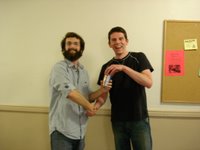
Congratulations to Nick, winner of the Irn Bru competition. Nick is one of the many students at PTS who aspire. I'm not sure what he aspires to, but that doesn't matter - on the fourth floor of Alexander Hall you just need to glow aspiration. And Nick, as you can see, knows how to glow.
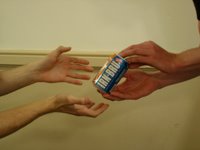
Thanks to Noah Carlson for taking the pictures. Nick and Noah are founding members of the 4th Alex Fraternal. More on that later.
PS - it's a big secret - don't tell anyone about it...
Football
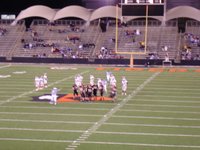 My first football game. Princeton Tigers v Brown - a college game. These pictures aren't great - but I was chuffed to catch video footage of the first touchdown on my camera - I just don't know how to post movie clip footage on blogger.
My first football game. Princeton Tigers v Brown - a college game. These pictures aren't great - but I was chuffed to catch video footage of the first touchdown on my camera - I just don't know how to post movie clip footage on blogger. The first half was rather dull - I tried to read Mark Strom's Reframing Paul - but it was too cold.
The first half was rather dull - I tried to read Mark Strom's Reframing Paul - but it was too cold.
 Benjamin is one of my friends from the international students' orientation week. An up-and-coming German scholar, Benjamin is a doctoral research student looking at the influence of Karl Barth on Hans Urs von Balthasar. Benjamin is one of the few people here that understands the implications of the Jesus of history/Christ of Faith debate. The hours fly in at the Tap Room when we discuss ideas of revelation over some Samuel Adams lager - possibly the nicest American beer I've tried so far - the quality of the conversation is usually poor, at least the Protestant contribution!!
Benjamin is one of my friends from the international students' orientation week. An up-and-coming German scholar, Benjamin is a doctoral research student looking at the influence of Karl Barth on Hans Urs von Balthasar. Benjamin is one of the few people here that understands the implications of the Jesus of history/Christ of Faith debate. The hours fly in at the Tap Room when we discuss ideas of revelation over some Samuel Adams lager - possibly the nicest American beer I've tried so far - the quality of the conversation is usually poor, at least the Protestant contribution!!
Wednesday, October 11, 2006
Postmillennial rhetoric: no. 1
'The Messianic Kingdom' Charles Elliott
The Presbyterian Review Vol. 3 No. 10 (1882), p 238.
Saturday, October 07, 2006
Home comforts

A can of Irn-bru to the first Princeton Theological Seminary student who gets in touch with me through my blog. (I've no idea if anyone reads itothehills.)
I plan to auction the other two. Kieran Dodds showed me a shop in Greenwich, New York, that sold all things British - including Barr's finest fizzy pop.
Only thing is, ain't no sausage supper shops in Princeton. If anyone knows otherwise, two cans of Irn-bru to you.
Kirkin' o' the Tartan
Just before I left Glasgow for Princeton in September, I bumped into one of my old D&T colleagues. He was a guy who left D&T to travel the States with his girlfriend selling shoes at Scots Highland conventions. Seriously! At the time we were told there was a market for this kind of thing. People just lapped up the traditional Scottish Highland dress thing, and, if you are going to wear a kilt, you need the right kind of shoes, right?

I thought about Nick yesterday as I read an invitation to preach in South Carolina, at a Kirkin' o' the Tartan event. The invitation came through the seminary. A former student was looking for 'a real Scot' to speak at an event in his church. Apart from Prof Torrance, I'm the only real Scot here, at least among the student population.
Yikes! I've been here one month, and already I'm buying into the whole thing! A funny little providence makes all this seem appropriate. I'm at PTS through the Peter Marshall Bursary scholarship, set up between Trinity College, Glasgow, and Princeton Theological Seminary. Peter Marshall was a Scot who came to America as a young man in 1927, became a Presbyterian minister, and ended up as chaplain to the US Senate in Washington D.C. Marshall, to some extent at least, contributed to the Kirkin' o' the Tartan tradition in the States.
So, I'm stepping into the breach, and carrying on the testimony to Scottish pride of place in the US. Jack McConnell can be proud - I just hope I look as good as he did on my own big day in tartan.
New York

Okay, so, I'm in Princeton, New Jersey. I'm going about my business, and I get a call on my cell phone. It's Kieran Dodds, international man of mischief. He tells me he's on a tour of the States, drummin' up business, checkin' out opportunities to consolidate his growing domination of the photo-journalistic world.
He's staying in the City. He wants to meet - but he needs to see some big cheese first. I tell him I'll head to Penn station, and wait for his call.
We end up going for some food. Kieran is a pro, but chop sticks lend opportunity for him to show his fun side. At heart, he's a big kid in a big city. Luckily, we've got good company to guide us.
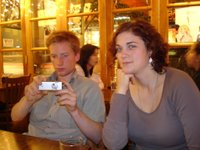
Friday

Friday was a good day. The next two or three posts are based on events or opportunities that materialised yesterday. In the midst of all these things I'm falling in love with the States, I'm realising just how weird and crazy the place is, and, just maybe, I'm selling out on being cool young and sorted. I'm buying into the dream!
Here's is a photo of Time Square. And, as for the photo of me looking cool in the City, what I'm drinking will become apparent as you read later posts...

Monday, October 02, 2006
Funeral Songs
If I was forced to choose a Sinatra song for my own funeral, I'd go with something just a little different. The one about Chicago being my kind of town, perhaps. Or maybe Come Fly With Me, or, the one about the tall tanned young lovely girl from Ipanema. Anything that avoids thinking about death.
How come we use pop songs all wrong? I hear James Blunt's 'You're Beautiful' is really popular at weddings and stuff. That's really stupid when you think about it.
Or maybe it's not. Maybe the whole point is that we avoid thinking about meaning, because we've given up on any value or truth in our communications. The end is all that matters - if a piece of music evokes a mood, who cares about the words? Alternatively, if the words of a song are good, who cares if the tune has other associations - but that's another gripe of mine, for another post.
Silly Shed
So, I think to myself, 'Hey! the Dinky ride ain't too long. I'll walk it.'
So, I start walking into the New Jersey darkness. I reckon that if I follow the rail track I'll be fine. Only thing is, it's dark. But I persuade myself that sooner or later I'll see the bright lights of Princeton. Sooner or later, I decide I'm not going to see the bright lights of Princeton soon. I'm on Alexander Rd. I come to a junction I recognise, but the sign is for Trenton. I've just been there, and I don't want to go back.
So, I walk in the opposite direction. But I'm getting nowhere fast. My innate survival instincts kick in. Should I text one of my friends at the seminary? No, that would be embarrassing. Luckily, my survival instincts tell me that I know the way back to Princeton Junction station.
So, I get back on to Alexander Rd. I walk back to Princeton Junction station, just in time to hear the Dinky horn tooting as it leaves again for Princeton. I'm sweating, but I'm safe. I wait for the next ride, thinking about the New Jersey darkness that my survival instincts delivered me from.
So, I get back to Princeton on the next ride. I struggle along the street to Wawa for a coffee and donut. I need sugar fast. As I wander up the street to the seminary, I realise that I'm walking along Alexander Rd...
So, remember, don't be a silly Shed. Never go for a walk in a strange place at night, even if your sense of direction is as good as mine. All roads will take you places - few will take you where you want to go.
Monday, September 25, 2006
Keller Belle and Sebastian
Last night I was at Redeemer Presbyterian Church in New York. TK was the preacher. I might post on the experience as a whole, but I'm not sure. Redeemer is something of a mega church, it is a city church, and one of its meeting places is an auditorium at Hunter College, NYC. What, with the Jazz style, the huge crowd, and the non-churchy location, this probably was church (singing, praying, preaching, offering), but not as I know it. It just felt different - more later, perhaps.
One thing struck me as I observed and pondered - this church is younger than I am, and it was born round about the time that I became a Christian. And many of the people at Redeemer last night probably knew nothing other than Redeemer Presbyterian Church as their model church. There's a thought - how culturally conditioned we are, even when it comes to the most important things in life.
Back at the Keller blog I noticed Belle and Sebastian on the music list. These guys are no strangers to itothehills. Not sure if I've mentioned this before, but I flew to London on the same plane as B&S in June. It was funny because they were so un-rock and roll. I expected cigarettes and alcohol, but all I saw was tuna salad and mineral water. Each member of the band sat at a window seat, I hope they are still on speaking terms. Life on the road in the air must be tough at times.
Sunday, September 24, 2006
Game
(Spotting three different Scottish individuals will get you full marks. If you look closely, you might also spot the Ruffled Dean.)
Young cool and sorted

Went to church this morning with my new sandals on, and no socks. The service was a joint celebration to mark the end of a year of events based on 250 years of 'Presbyterian Presence in Princeton'.
This afternoon, I'm off to New York again to visit Redeemer Presbyterian Church. Not sure about the sandals for this trip. Reading material on the train will be either Stout's book on the Civil War, or Ishiguro's latest novel, Never Let Me Go.
Saturday, September 23, 2006
International relations
And tonight both these men taught me some more about the meaning of life. Can any Christian really doubt that God works for good in all things?
Wednesday, September 20, 2006
Ruff day

Yesterday I saw a man wearing a ruff - and, I don't think he was having a laugh. No, he was in earnest. It was the Opening Convocation for the 195th Academic Year at Princeton Theological Seminary...
All incoming students enjoyed a reception at the house of President Iain Torrance. We then tottered over to the steps of Miller Chapel for the Class photograph. Then it was dinner with the President and Faculty. Then the convocation service, where Professor Gordon Graham gave his inaugural lecture as the new Professor of Philosophy. Then a few of us went downtown to unwind.
It was a great day. The more people I meet here, the more I feel pretty out of my depth. You bump into former moderators of the Church of Scotland - but they are the least impressive of an illustrious community of Christian people. Numerous international students on my Th.M. course who are pastors, and who teach at seminaries. American nationals who are top notch scholars and professionals (e.g. one individual who received a distinction working at Cambridge with John Polkinghorne).
Daft thing is, I keep forgetting to carry my camera - so, sorry, but you'll have to make do with the animated ruff. (Seriously, one of the Deans was wearing a ruff round his neck...)
Monday, September 18, 2006
Mostly coffee and donuts...
But there is lots to look forward to, and lots to think about. Today, I attended a lecture about Princeton and the civil rights movement. Apparently the town is something of an enigma in this history. On the one hand, up until the mid-20th century it was regarded as a northern town with southern attitudes, or a southern town in the north. But it was one of the first towns to desegregate schools. Of course, revision of all this history is now questioning just how effective this desegregation has been - according to one woman in Witherspoon Church, a black woman who experienced this change, black children only became aware of segregation and racial inequality when they started attending mixed schools.
This week all Princeton students have the opportunity of unlimited free rail travel to New York. I'm planning 3 trips - one on Thursday, one on Saturday, and one on Sunday. The Sunday trip will be a visit to Redeemer Presbyterian Church - I'm choosing the early evening service - jazz style - nicee!
Tomorrow, I meet my advisor of studies - Dr James Moorhead - he's a specialist in 19thC American Church History - my kind of guy - grreat!
Princeton People
Wednesday, September 13, 2006
Barth for breakfast

Church Dogmatics IV.1 The Doctrine of Reconciliation - my major reading for a class on the doctrine of atonement with Bruce McCormack. T.F. Torrance wrote that CD IV 'surely constitutes the most powerful work on the doctrine of atoning reconcilation ever written.'
I'm really looking forward to it, and I'll try to relate this reading to current debates among evangelicals about the doctrine. I'll probably have to write a class paper, perhaps I'll post it some time next semester.
This post is dedicated to my friend, my student minister colleague and my mentor in all things Barthian - all one and the same person, Keith Edwin Graham.
Tuesday, September 12, 2006
The beginning
I'll post a review and thoughts on this book at my Shed on Shedd blog in due course. It will be the foundation for my proposed dissertation on Shedd - I've ordered his Dogmatic Theology from Amazon.com - and I'll try and read most of his other major published writings, as well as lesser but no less interesting work, such as his contributions to the Confession debate in late 19thC Presbyterianism, and his Literary Essays. (Shedd taught literature before becoming a theologian - he edited an edition of the works of Coleridge.)
You can find my Amazon.com wish list here.
Stateside
One week can be a long time in politics. So far Shed in Princeton hasn't been the catalyst for any revolutions - apart from the revolution in his own life, perhaps.
I'm writing this from my top floor dorm room in Alexander Hall, Princeton Theological Seminary, on my brand new Toshiba Satellite Notebook. Ten days ago I was working on an old IBM desktop pc (Windows 98). I was in my little flat in Glasgow. Here I am today in the US, and finally in the 21st century with my laptop an' all. Part of me feels I've arrived - maybe it's just the jetlag still affecting my emotions.
It's going to be a great year. I've already started to make some good and interesting friends. I'm already fascinated by all things American. The huge 'Welcome to the United States of America' in the lobby at Newark Airport was matched by a huge advert for Accenture that used Tiger as an all American hero. Newark is the first airport I've been in where I had to pay for the use of a luggage trolley... but, New Jersey is the first place where I've seen baby changing facilities in male restrooms. One of those things must be progressive I guess.
For the last week I've been settling into Seminary life at PTS. About 25 international students are being oriented in all things necessary to survive 9 months here. I've been impressed by the care and thought that has gone into the program. We have been well looked after. For example, the canteen was closed over the weekend, so we each got $70 petty cash to spend on food (effectively, to cover only two meals, because we got breakfast boxes both days, and we were at two bbqs too.)
The seminary is pretty cool. The campus is smaller than I thought it would be. Opposite is me standing in the heart of it all, with Alexander Hall in the background. At the moment the place is pretty quiet, but it will get busier next week when all the normal students return to read Barth and stuff. I've already met some returning students, including my dorm deacons (Hudson and Jeff). These folks all seem fairly cool, young and sorted. I'm going to have to work real hard to fit in - but I'll try, even if I stop short of smoking a pipe. (Yes, that seems to be the cool seminarian thing to do!)
The place is just full of history. Perhaps I'm just too familiar with some of the figures of that history. But I get tingles when I read plaques with names like Hodge, Warfield, Green, Alexander, and Miller on them. I'm just not sure how many people here really understand or appreciate that legacy. Early days so far, but I've yet to meet anyone who really knows the work of these guys well.
Today is 9/11. In the last two days I've started to really notice stuff about the US. I had hoped to write about that in this first post, but I'll have to leave it until later. I'll leave you with my experience of church on Sunday morning. I heard a stirring sermon, critical of the powers that be, making mention of Iraq, Katrina, 9/11, lies, slavery. It was the first 'liberation' sermon I've heard where a really important question was asked, even if it was only in a passing comment: 'Who might God be against in our time?'
I think liberal and conservative preachers alike need to preach on this theme to recapture a prophetic spirit. 'Justice and peace' Christianity doesn't preach God's judgement on oppressive powerful people in our world. It tends to be hopelessly weak because it is tied to a universalism that guts its message of any relevance. All is ultimately pie in the sky for everyone, so why bother about today.
On the other side, conservatives are too concerned with saving a lost cause (the church in the West) to really speak the gospel message to a desperately needy world. If they gave up that cause they might find that people started to listen. After all, conservatives and liberals love to use the same prophetic texts - texts that speak of judgement, justice, hope, peace, and love. These texts speak about God too - I think most people have forgotten about him though - they certainly don't like to refer to 'him' - God is slowly becoming a concept rather than a named, personal being who feels, thinks, responds and acts because he cares. I will probably have to think again about the inclusive language debate, the gender question, and all those tiresome issues that strangle the spiritual life out of most of us in theological studies.
One conversation illustrated all this for me. After the service on Sunday morning, a man turned round to greet me. He asked if I knew anyone in Scotland with a peculiarly Scottish name (McEwan). This man himself was a McEwan. His family had come from a plantation in Tennessee, and the owner had been a McEwan, from Glasgow... The Scottish influence here Stateside is mixed, and it is still fermenting. I think I'm going to learn loads of stuff over the next 9 months, about history and theology, about the US and about other countries too, but mostly about myself. You have all been warned!
Friday, September 01, 2006
America

On September 6th I fly to Newark, NJ, to begin life as an international student at Princeton Theological Seminary. I am getting picked up at the airport by seminary people.
For the next few days I'll be preparing for this trip, packing stuff to take, and taking care of things that need to be sorted before I go.
My next blog post will be written in the USA! I expect the first week or so I'll be dizzy with excitement. You can look forward to some sensible posts from the middle of September onwards.
Wednesday, August 23, 2006
The Call
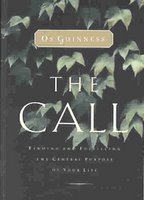 Here's a review of one of my favourite books. The review originally featured in an edition of Tron Times, the church news letter of St George's Tron, Glasgow. I think I wrote it in 2003. Everyone should read this book.
Here's a review of one of my favourite books. The review originally featured in an edition of Tron Times, the church news letter of St George's Tron, Glasgow. I think I wrote it in 2003. Everyone should read this book.I bought The Call about this time last year, and finished reading it while I was away from home working in England. My first instinct was to keep it in a place that was close to hand and so, on returning to Glasgow, it found a place in my special shelf.
Why is this book special? Well, at first sight it doesn’t seem so. The cover gives little away. Indeed, the title would normally arouse my contempt and suspicion: “Not another book on discovering God’s will…” There is no foreword or introduction. Only a note at the end of the contents page gives a clue about what Guinness has given us. The chapters – 26 in all – are intended to be individual meditations. Yet, together, they guide us through all the channels of working out what life is really about, and what God’s calling means.
Each chapter is not more than 12 pages. However, they are all packed with stories of significance. Each story illustrates an aspect of calling. This theme is further illustrated, discussed and thoroughly applied to the world, and our place in it. These illustrations are meaty in themselves. They are taken from the lives and writings of great men and women of the past. You will learn more about history in this book than you will in most history books.
What is God’s calling? Well, it is not the same as trying to determine God’s will for your life. However, it is related to that search. Here is what Guinness writes in the first of his meditations: “Calling is the truth that God calls us to himself so decisively that everything we are, everything we do, and everything we have is invested with a special devotion and dynamism lived out as a response to his summons and service.” To summarise this argument, everyone, everywhere, and in everything should think, speak, live, and act entirely for God. All of this is to be through Christ, and for Christ. We are not called to something (job, relationship, role), or somewhere (the inner city, or Outer Mongolia). We are called to Him. Everything else – our work, our relationships, our desires – must rest on this foundation.
Radical and orthodox. That is one way to describe the impact of this book. Protestant and Catholic distortions about calling and vocation are described and ditched as inadequate and harmful to spiritual growth and maturity. The ideologies and trends of modern life are put to the test, and found wanting. But the reader is forced to think about his or her own values. Do we live for ourselves, or have we heard and answered the call of Jesus of Nazareth? Are we prepared for the cost and the pain involved in that vocation?
Os Guinness will not write a more enduring work. If you like good, elegant writing you will revel in its pages. The style is not light, so be prepared to re-read sentences, or think through paragraphs. You will discover truth and insights that should change your life for good. Aimed primarily at Christians, any thoughtful man or woman will enjoy this book by one of the great, popular thinkers in the church today.
Tuesday, August 22, 2006
Fun with Fivers
Rumour has it that Simon will be making an appearance at my 'going away to Princeton' party/event. Varwell's people are keeping quiet about the rumours - plans to control the crowd are already being put into effect.
Another disclaimer
So, in case you read Mark Driscoll, I just want to share with you my concern about the tone of his latest post. Those of you that know me, know that I've got serious issues with the Church of Scotland's law. So, I can understand Driscoll's views.
(I refer to the Kirk's law, because it appears to me that the Kirk is founded on what is effectively a combination of case law and law 'by committee report'. Faith, belief, and practice feel entirely separate from this 'legal' construction. Your attitude to the Kirk in general needs to refer to its law, rather than individual churches or members in the organisation. In practice, ministers have to uphold the law of the CofS above anything else.)
My problem is that Driscoll's post as a whole just plays to his audience, and presumably it aims to attract disillusioned mainliners. It's not surprising that Driscoll jnr agrees with his mega cool, mega manly, mega church pop star Dad, either. Driscoll's continuing success relies on the confusion (and the destruction?) of the mainline churches.
It strikes me that so many preachers and church leaders need some kind of foil. Why is that? Is it some Hegelian thing going on? Or is all just hubris? I used to preach in a style that assumed an opposing side, or an opposing argument, to everything that I was saying. I preached as if I was trying to win a debate - booorrrrrinnnggggg!!!!
I think preaching that majors on undermining or attacking 'error' lacks... well, something. I now try to tackle error and ignorance through the winsome declaration of truth. If people have problems or issues, that will soon enough become apparent in the ongoing pastoral relationship...
'Rev Shedden, I was wondering if you could defend the 4th point of Calvin's Famous Five for me...' Realistic - I think not. More to the point - 'Dave, I'm feeling really crap at the moment...'
PS
Monday, August 21, 2006
Problem solved
Saturday, August 19, 2006
Friday, August 18, 2006
National Gallery of Scotland
Alas, there were no postcards of any of these etchings in the gallery shop. I've experienced this disappointment with gallery shops before - I can never get a postcard print of the picture that caught my imagination. Perhaps I've just got a weird imagination compared to Joe Public.
Galleries are great! Lots of families, with parents totally unable to answer questions from kids: 'Mummy, who's that?' 'Lu..ther. Luther.' (The picture was strange, but it depicted Luther's breakthrough on the doctrine of justification by faith alone. I'd say more, but there was no postcard available...) Lots of people saying really silly things: 'I've seen that before somewhere... Aye, I've definitely seen that somewhere before.' (This time, we're talking about Raeburn's 'Reverend Robert Walker Skating on Duddingston Loch' - the single most famous Scottish picture, ever, perhaps?)
One highlight today was this: The Trinity Altar Piece by Hugo van der Goes. I'd never seen it before. First thing I thought was: who's that bloke like Jesus holding the body of Jesus? My little head couldn't work it out until I read the title of the work.
No matter how you understand and apply the first two or three commandments, you've got to marvel at the theological understanding behind this image. Almost as much as you've got to marvel at the realism of Rembrandt's biblical etchings and paintings. I don't remember seeing an artisic representation of God the Father that portrayed his likeness to the Son. Or, should that not be the other way about? Therein lies the problem of such art, and the wonder of the triune nature of God.
Who is Simon Varwell?
I had the pleasure of meeting Simon for two or three drinks two weeks ago. It was my first 'blog' date. However, there was at least one connection, so it wasn't entirely blog-random. (I know Simon's brother from my time on Skye last summer.)
Varwell is not only a top-quality blogger, he's also interesting and funny and talented. All these come together in many of his schemes - the Mullet Search, and the Church Search being two classic examples in his career.
But here is another scheme in the making - hilarious, will we ever dare write our names down again?
Thursday, August 17, 2006
Wine Wisdom and Song
Loosely based on a true text, Ephesians 5:15-20.
From a pulpit near you soon.
Mistake
8.00 a.m. Classes begin
Surely some mistake. That's breakfast time!
Wednesday, August 16, 2006
Flowers, Fountains and Flatmates
JJ and I went for a walk this afternoon. We sauntered into town through Glasgow Green, popped into Tescos, and then returned via the People's Palace.
We came upon this:

The Doulton Fountain, the largest terracotta fountain in the world. Sorry about the photo. But, basically, it's a symbol of Victorian Empire. QV stands at the apex, her soldiers just below her, with four lands under her authority: Canada, South Africa, Australia, and India.
Here's India:


Reframing the Reformed (or, Turkeys voting for Christmas?)
Sage and onion is the classic combo for a really tasty stuffing. Nothing at all to do with The Foolish Sage, a blogger I discovered early in my blogging career. Mark was, perhaps still is, a student at Westminster Theological Seminary in Philadelphia. His posts are usually good quality book reviews or thoughts on all things reformed, evangelical, theological, and ecclesiological. I quickly learned loads about evangelical Presbyterianism in the US through reading Mark's posts, and following the discussions that followed.
In a recent post Foolish Sage touches on a subject that has bothered me for a long time. In fact, Mark republishes his review of Mark Strom's Reframing Paul: Conversations in Grace and Community. I've not read this book. But I get the feeling I will need to look at it soon.
Apparently, Strom considers Paul the Apostle's view of church life. You can read the review for yourself (this paragraph is my paraphrase of one aspect). Strom provides a serious challenge to the Reformed view of church as a word centred environment. Currently, meeting as the church means gathering to listen to the preaching of God's word. As a consequence the church has become pastor/preacher centred. Strom thinks that this is actually the kind of thing Paul opposed, because Strom compares typical Reformed models of preaching and teaching in church with the Greek thinkers prominent in the first century. He refutes the notion that modern Reformed evangelical norms find any model in Paul's way of Christian ministry.
Nothing seriously new with these ideas. I've thought along these lines for some time, mostly because of the influence of one or two seriously on-the-ball Christian friends and ex-flatmates.
The new thing that began to bother me was the implication of this line of thinking. I did some research on Strom, and, among other things, I came across this interview with Tony Payne. It's from 2001, and it includes this quote about Strom's unease with modern theological education:
...about what's taught at Moore, or Westminster or wherever. I see a lot of good things taught in these places. The emphasis on biblical theology is a welcome shift. But I also see a social system that remains and that is at odds with that very biblical theology. It makes it even more intolerable to me. If I thought in terms of classical theology, then at least this hierarchical structure could be rationalised. But once I see church in terms of biblical theology, as the assembly of God's people which emerged through Israel's history and culminated in Christ--if we took this really seriously, none of us would end up arguing for the conventions of being an Anglican or Presbyterian or Baptist or whatever.
I'm obviously a fan of biblical theology. I wrote Days are Coming. I studied at Westminster which was largely responsible for its modern revival as a method of doing theology. But I believe the method and its practitioners never fully left the split behind. Now we see a split between redemptive history and so-called 'ordinary' history. Some of the scholars with whom I have interacted operate with two constructs in their minds; ordinary history, the sources of first century social history, which is profane, and redemptive history which is the only pure and proper history. This can only, in the end, reinforce our disengagement from the world.

This all reminds me of a thought I sometimes share with people. The church as we know it in the UK is full of problems. I am preparing to become a servant of that church, a knight in shining armour to save the day, perhaps? No, just the opposite, it turns out. If Strom is right, the moment I become a minister in the CofS I will become part of the problem. So, either I should vote for Christmas, or I should start a campaign to ban it. Thing is, I really love my sage and onion stuffing...








